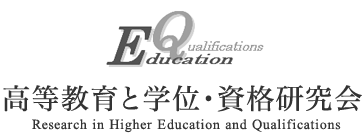

"Non-University Higher Education1 and Qualification Framework"(EQ)
Keiichi YOSHIMOTO, Professor, Faculty of Human-Environment Studies, Kyushu University
E-mail: yosimoto@edu.kyushu-u.ac.jp
Project Number: 21243044(http://kaken.nii.ac.jp/en/p/21243044)
From April 2009 to March 2013
The purpose of this research project is to investigate a framework of non-university higher education and qualification framework in Japan, by comparative research both domestically and internationally.
Since 1970's, various "non-university" higher education institutions(HEIs) have developed in advanced countries, for response to new needs of human resources. However, each of these countries has many problems on the relation between university sectors and other higher education sectors.
In Japan, 97.9 percent of students go to high schools after compulsory education. After graduating from high schools, 47.2percent go to four-year universities (773 institutions), 6.2 percent to junior colleges (406 institutions), 14.7 percent to specialized training colleges (3,350 institutions), and the rest 18.1 percent into labour market(in 2009 academic year). Thus about a quarter of the Japanese youth go to non-university HEIs. However, national qualification system covering both academic qualifications and vocational qualifications has not been well developed in Japan yet. On the other hand, establishment of new type of HEI focused on vocational education and training (VET) is discussed. Nevertheless, there are many issues to be decided and solved, including the problem of positioning of specialized training colleges in law.
Most studies on higher education have focused on university sectors and some focused on Junior College, however, not so many on specialized training colleges and colleges of technology.
Through this research and consideration, we can understand the Japanese characteristics of expanding non-university higher education whose substances have not been made clear yet. And we can refine the arguments about Japanese higher vocational education in universities and non-university institutions. It will contribute to the total refining of the higher educational theories.
1 Higher education sector in Japan has mainly four types of institutions: universities, junior colleges, specialized training colleges and colleges of technology (only the part of the latter 3 years). The type of institution is correspondent with the type of degree: universities provide degree courses over ISCED level 5a and junior colleges, colleges of technology and specialized training colleges provide associate-degree course, ISCED level 5b. In some countries like Australia, the term of 'higher education' is used only to indicate university, so other institutions like TAFE belongs to "tertiary education." Here, "Non-University Higher Education" is defined as containing junior colleges, specialized training colleges and colleges of technology. Further to colleges of technology, they are 5 years institutions for students after compulsory education especially in engineering. In 2009 academic year, 64 institutions and 0.9 percent of students go after compulsory education.
A) What kind of education and training system does Japanese non-university HEIs belong to?
What is the relationship with HE and VET?
And how should it be in the future?
- university-led unitary HE system
- double/multiple track system
B) What is the key element of professional/vocational education in non-university HEIs compared with that in university?
What are the commonalities and differences among various non-university HEIs?
- goals : occupational careers and competencies
- means :
> practice/experience -based on learning
> involvements of industries and stakeholders into study programs
> teaching staffs with work experiences
- coordination : institution / government / markets and stakeholders
C) What is the key concept for making relevance of national qualification framework to encourage non-university higher education?
- parity of esteem, partnership and permeability
D) How is the situation of A), B) and C) in other developed countries?
- UK, France, Germany, Netherlands, and other European countries, Korea, Australia and US
お問い合わせ
〒812-8581
福岡市東区箱崎6-19-1
九州大学大学院人間環境学研究院
教育社会学研究室内
研究会事務局
Tel&Fax 092-642-3125
E-mail eduqual22@gmail.com